26 Rabbis Call On Latimer to Challenge Bowman for Congress
- Details
- Written by: Joanne Wallenstein
- Hits: 8869

Monday, October 16, 2023
1 Heshvan 5784
Dear Mr. Latimer,
We are rabbis from across the Jewish denominational spectrum. While we represent congregations and organizations throughout New York’s 16th Congressional District, today, we are writing in our personal capacities, to urge you to announce your run for Congress.
For over three decades, our community was represented in Congress by a Democratic champion who consistently delivered for the people of Westchester and represented our core values in Washington, especially in unwavering support for Israel’s safety and security.
Three years ago, Jamaal Bowman unseated Eliot Engel and brought a deeply concerning agenda to Washington. Many of us tried to engage the Congressman early in his term, seeking constructive dialogue about the damaging positions he took – especially on matters related to America’s relationship with Israel.
Regrettably, Congressman Bowman disregarded our outreach and doubled down on his anti-Israel policy positions and messaging.
Last April, many of us signed an open letter to Bowman citing his troubling record and urging him to change course.
We were once again met with silence – and then, even more damaging actions in Congress. Bowman boycotted President Herzog’s historic speech, refused to sign a resolution that rejected Israel as a racist or apartheid state, and voted against legislation supporting the Abraham Accords and celebrating Israel’s 75th anniversary of statehood.
Last week, more than 1,300 Israelis were brutally massacred by Hamas terrorists. Thousands of others were physically, sexually, and psychologically injured, to say nothing of the nearly 200 taken hostage. Your statement of unequivocal support for our ally was immensely appreciated by our community.
Inexplicably, but predictably, while Congressman Bowman condemned the attacks, he put the blame on Israel for its “blockade of Gaza.” He now is calling for an immediate ceasefire, effectively a position of appeasement toward Hamas’s terror regime.
Since being elected, Bowman has led the effort to erode support for Israel on Capitol Hill and within the Democratic Party. That’s why we’re turning to you, in the hope that you will announce your candidacy for Congress and restore our values to this important seat in Washington.
Your election would be a vital course correction from the last three years. We are behind you, and we know that our communities will strongly support you if you enter the race. Your remarks at the Westchester Jewish Council Community Rally on Tuesday, October 10th, gave us great hope that you would bring the same unflinching moral courage and conviction to an office where it is desperately needed at this crucial time.
We look forward to hearing from you soon and continuing our dialogue.
Sincerely,
Rabbi Jonathan E. Blake
Rabbi Jeffrey Arnowitz
Rabbi Chaim Axelrod
Rabbi Sasha Baken
Rabbi Adam Baldachin
Rabbi Lester Bronstein
Rabbi Jeffrey Brown
Rabbi Leah Citrin
Rabbi Menachem Creditor
Rabbi Reuven Fink
Rabbi Leora Frankel
Rabbi Howard Goldsmith
Rabbi Daniel Gropper
Rabbi Shmuel Hain
Rabbi Evan Hoffman
Rabbi David Holtz
Rabbi Nuriel Klinger
Rabbi Binyamin Krauss
Rabbi Chaim Marder
Rabbi Jonathan Morgenstern
Rabbi Daniel Reiser
Rabbi David Schuck
Rabbi Zach Sitkin
Rabbi Jay Stein
Rabbi Annie Tucker
Rabbi Scott Weiner
Commenting on the letter, Susan Douglass wrote this note to her Rabbi Jeffrey Brown:
Dear Jeff,
I was delighted to see your name on the letter to George Latimer, along with 25 other area rabbis, asking Mr. Latimer to run for Congress in our district (Scarsdale10583.com article from October 16). It's important to take a stand against those who are equivocal, or downright hostile, in their support for Israel.
Shabbat Shalom,
Susan
Social Media Threats: How to React?
- Details
- Written by: Joanne Wallenstein
- Hits: 15541
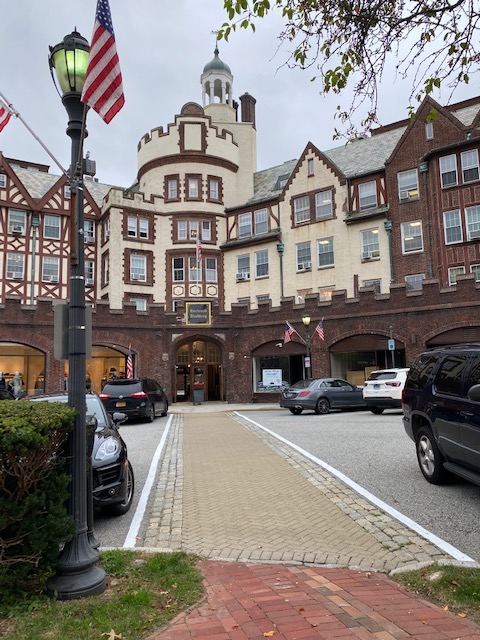 (Updated 6:55 PM) The community is on edge after social media sites are disseminating a threat from Hamas designating Friday October 13, 2023 as "the Friday of al-Aqsa Flood." While there are no specific threats to Scarsdale the threats are ominous after last weekend’s horrific attacks in Israel. What to do? Carry on as usual? Send the kids to school? Take the train to the city? Stay home? What do you think?
(Updated 6:55 PM) The community is on edge after social media sites are disseminating a threat from Hamas designating Friday October 13, 2023 as "the Friday of al-Aqsa Flood." While there are no specific threats to Scarsdale the threats are ominous after last weekend’s horrific attacks in Israel. What to do? Carry on as usual? Send the kids to school? Take the train to the city? Stay home? What do you think?
Here are notes from the Scarsdale Police, Scarsdale Schools and the Scarsdale Public Library discussing the threat.
Scarsdale Police
We are aware that Hamas has issued an official statement designating Friday, October 13, 2023, a day of action titled "the Friday of al-Aqsa Flood." In their announcement, Hamas called on the international community to voice solidarity with the Palestinian people and their cause by engaging in mass gatherings. A video has also surfaced of a founding member and former Hamas leader praising the recent terrorist attacks and calling on others to mobilize on October 13.
Although there are currently no known threats to the Scarsdale Community, the Scarsdale Police Department continues to work with State and County law enforcement agencies to monitor the situation. Scarsdale Police Department’s additional patrol and premise checks of all synagogues and educational institutions that began at the first sign of the attacks have continued. You may notice increased police presence at all of Scarsdale’s schools and synagogues tomorrow throughout the day. This has been planned out of an abundance of caution and should not be reason to believe that any specific threats have been made.
The situation will continue to be monitored over the coming days and more information will be released when available and appropriate. As always, if you see something, say something. If you need to contact our police department in an emergency, please dial 911. If you need to get in touch with the police and it is not an emergency, please dial 914.722.1200.
From the Scarsdale Schools:
Increasingly our communities have been exposed to scary and unsettling information posted on social media, covered by the traditional media, or sparked through rumor.
We are writing to inform you about a highly disturbing situation being spread through social media.
On October 10, 2023, Hamas issued an official statement designating Friday, October 13, 2023, a day of action titled "the Friday of al-Aqsa Flood." They called on the international community to voice solidarity with the Palestinian people and their cause by engaging in mass gatherings. A video has also surfaced featuring a founding member and former Hamas leader praising the recent attack and calling on everyone to mobilize. He stated that jihad is everyone's duty and an individual responsibility. Subsequently, there have been social media posts carrying that video and connecting it to a possible threat against schools along with houses of worship and institutions related to Judaism.
This post is an example of what is being circulated. The FBI is aware of the situation and while they continue to collect and analyze intelligence from a variety of sources, they do not currently have specific intelligence reflecting additional attack planning against the United States. Additional information may be found in this FBI public service announcement.
Although there is no specific threat to Scarsdale, we have been in regular contact with Scarsdale Police who are monitoring the situation through the Real Time Crime Center. They are also increasing both patrols around our buildings and school walkthroughs. Additionally, we have informed all staff of the threat and instructed our safety monitors to exercise additional vigilance in their patrols. We will continue to monitor intelligence shared by local, state, and federal law enforcement entities to guide any additional response.
The proliferation of threats on social media in general, and this one in particular, has created a new problem in our lives. We are challenged to simultaneously make meaning for ourselves while guiding our children to process information like this in as emotionally healthy way as possible. These are daunting tasks. However, the most important protective factors we can give our children are positive and trusting relationships and a community that cares for one another. Those two factors are in abundance here in Scarsdale. As we have noted before, our counselors and clinicians stand ready to help guide you through conversations with your children and support your children here at school.
Please feel free to use the resources shared yesterday when speaking to your children or to reach out if you have any questions or concerns.
In Partnership,
Eric K. Rauschenbach
Assistant Superintendent for Special Education and Student Services
From the Scaarsdale Library

Regarding Recent Social Media Posts about Friday, October 13
A series of social media posts have been circulating designating Friday, October 13, a day of action titled "the Friday of al-Aqsa Flood." As a result, there have been social media posts sharing that video and connecting it to a possible threat against schools along with houses of worship and institutions related to Judaism.
Although there has been no specific threat to Scarsdale, the Library has been in contact with Scarsdale Police who are monitoring a wide variety of sources for any possible threats. We value the safety of our patrons and staff and will remain vigilant, taking precautions suggested by law enforcement.
Now Is The Time to Act to Preserve Neighborhood Character
- Details
- Written by: Joanne Wallenstein
- Hits: 3072
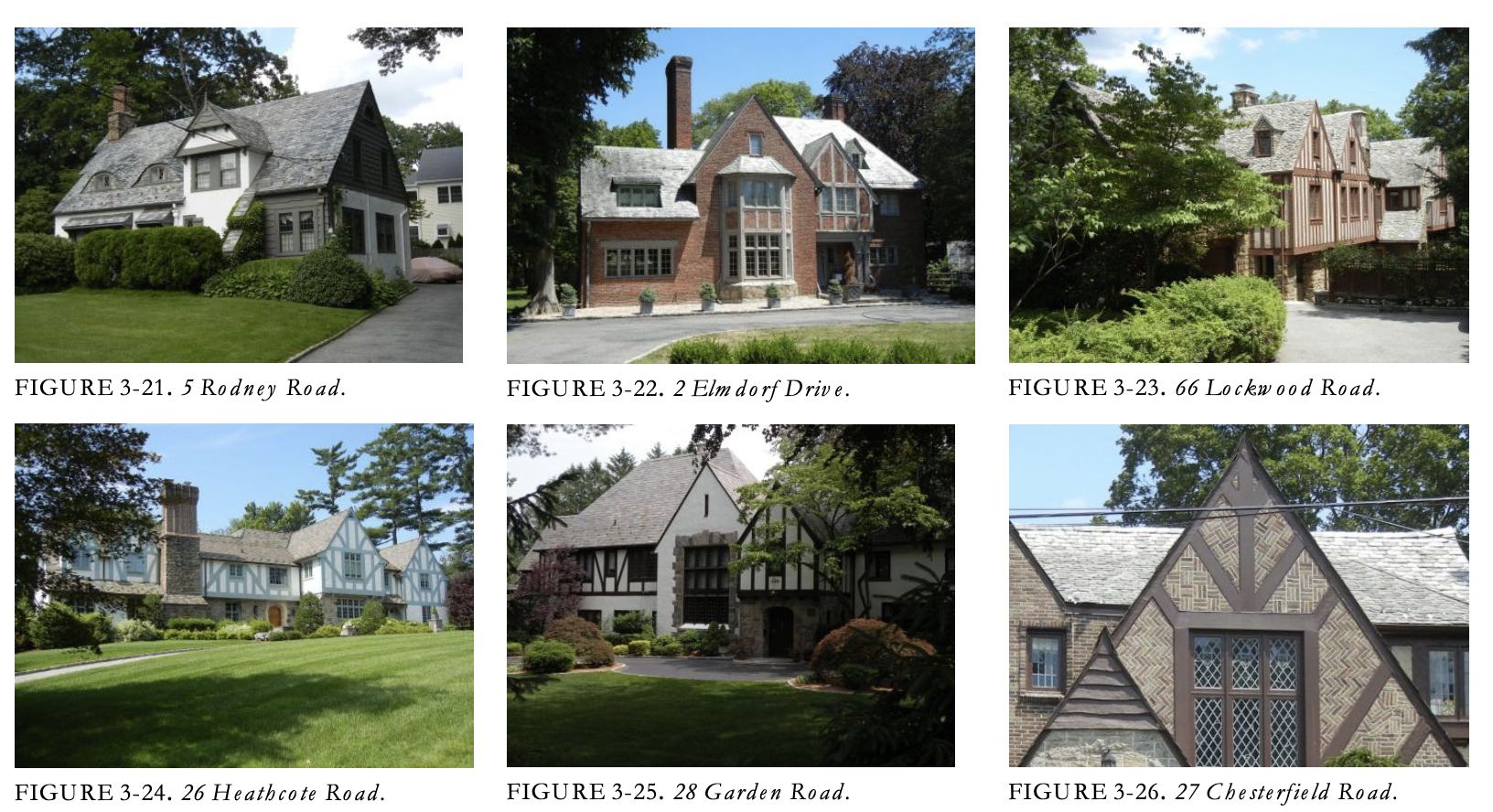 Every week we hear about Scarsdale land use boards wrestling with decisions about tear downs, renovations, subdivisions and swimming pools. One resident’s desire to expand their footprint impacts neighborhood character along with their neighbors view and privacy, the flow of water off the property, parking, traffic and more. Land use questions are further exacerbated by the frequency of strong rainstorms, which are causing alarming floods.
Every week we hear about Scarsdale land use boards wrestling with decisions about tear downs, renovations, subdivisions and swimming pools. One resident’s desire to expand their footprint impacts neighborhood character along with their neighbors view and privacy, the flow of water off the property, parking, traffic and more. Land use questions are further exacerbated by the frequency of strong rainstorms, which are causing alarming floods.
These conflicts are not new. In 2012 the Village Board of Trustees retained architectural historians to help determine how Scarsdale should preserve historic landmarks and homes as well as the neighborhood character of some of the Village’s historic districts.
The outcome of the Reconnaissance Level Cultural Resources Survey is an in depth look at the history of the development of Scarsdale, the architectural styles that make it distinctive and a road map of how to move forward on preserving our unique landscape.
The outcome of the report was the identification of 81 individual landmarks that warrant protection as well as the delineation of 12 study areas for neighborhoods that should be considered as potential historic districts.
These areas are listed below.
7.1 Greenacres Study Area
7.2 Scarsdale Heights Study Area
7.3 Garden Road Study Area
7.4 Fox Meadow Study Area
7.5 Elmdorf Drive Study Area
7.6 Downtown Study Area
7.7 Berkley Study Area
7.8 Sherbrooke Park Study Area
7.9 The Woods Study Area
7.10 Dolma Road Study Area
7.11 Heathcote Road Study Area
7.12 Heathcote Crest Study Area
The consultants that recommended next steps that should be taken to move the process forward as proscribed here.
Anticipated Next Steps:
Cultural Resource Survey Phase I: The Village to review the findings of the Report and assess the viability of potential individual landmarks and historic districts. If historic districts are not deemed feasible, the proposed number of individual landmarks should increase to include the most significant structures noted within the study areas.
Cultural Resource Survey Phase II: Following the Village’s acceptance of the Preservation
Consultant’s potential individual landmarks, Preservation Consultant to proceed with completion of New York State Historic Preservation Office Historic Resource Inventory Forms for selected individual landmarks.
If the concept of historic districts is to be further developed, the Preservation Consultant should perform additional research and field survey to finalize the number and boundaries of proposed historic districts.
Village to review the draft new Historic Preservation Law (Chapter 182), regarding the Village’s
criteria for establishing landmarks, including the requirement for owner consent, and the training of Village representatives serving on the Committee for Historic Preservation and the Board of Architectural Review regarding review of proposed demolition of and alterations to historic properties, and methods of implementation of the Village’s Historic Preservation Law.
Sadly, after receipt of the report the Village did not proceed with the consultants recommendations. In the intervening years, when applications are filed to tear down historic homes, boards have referred back to the report. However, since the findings of the consultants were never formally adopted, and the study was not complete, it could not be used to support or refute teardown applications.
As the Village continues to wrestle with decisions on teardowns, preservation, renovations, development and land use, perhaps it’s time to take the next steps as recommended by the consultants.
The report offers a comprehensive plan on how to approach this critical issue. We have instructions on how to move forward -- all we need to do is to take the next steps to put this into action.
Take a look at the report here: You might find your own home pictured there.
And if you’re in favor of urging the Board of Trustees to do more to preserve our neighborhoods, either comment below or email scarsdalecomments@gmail.com. We will communicate your views to the folks at Village Hall. The sooner we act the more of Scarsdale we can save.
Police Report: BMW Stolen at Gunpoint in Edgewood and More Bobcat Sightings
- Details
- Written by: Traci Dutton Ludwig
- Hits: 6594
 (Updated September 28, 2023) This week we have already reported the burglary of a Scarsdale stationary store and now and even more disturbing incident is being reported by the Scarsdale Police.
(Updated September 28, 2023) This week we have already reported the burglary of a Scarsdale stationary store and now and even more disturbing incident is being reported by the Scarsdale Police.
Here’s what happened:
On Sept. 27, at approximately 07:15 am, an Edgewood Road adult exited his house and proceeded to walk to his car, a BMW SUV, which was parked on the street. He was then suddenly approached by at least three men who displayed what appeared to be a handgun. The men demanded his property, which included car keys, and proceeded to steal the vehicle. They fled west on Edgewood Road, ultimately to the Bronx River Parkway southbound. Nobody was injured in the incident. The suspects arrived in what is believed to be a light-colored Dodge Charger with New Jersey plates, and detectives are investigating this vehicle. Scarsdale Police Department detectives are collaborating with area agencies in New York and New Jersey in an attempt to locate the stolen vehicle and the accomplice vehicle and to identify the suspects. Anyone with information is requested to contact the Scarsdale Police Department at 914.722.1200. Area residents are reminded to always report any suspicious activity to the police department 24 hours a day, seven days a week. In an emergency, dial 911.
According to Scarsdale Detective Brendan Kellaher, there was a similar incident in Eastchester two nights ago when thieves entered an occupied home, stole a set of car keys and took off in the car. That car was recovered in New Jersey last night. Scarsdale Police are tracking both the car and the accomplice vehicle from the incident in Edgewood. Kellaher said "it's a very uncommon crime. Technically this is robbery which is more serious that stealing a car."
Stolen
On Sept. 20, a young man reported his bicycle had been stolen from the bike rack in front of Scarsdale High School Sept. 15, 16 or 17. It was described as a gray and black Momentum UX3S bike.
Tools were stolen from a Butler Road construction site overnight and reported Sept. 21. The tools were valued at over $3,000.
A pair of black Oakley sunglasses was stolen from the ground at the high school track while the owner was running there Sept. 21.
Roofing, plumbing and masonry tools were stolen from a Paddington Road construction site Sept. 22. The tools were value at over $5,000. Additionally, over $2,500 worth of copper was stolen.
Suspicious
A caller reported her three-year-old son found a “campsite with a tarp filled with alcohol and vomit” in the area of Black Hawk and Continental roads Sept. 19. Police observed some debris strewn about the area but no clear evidence of a campsite. Sanitation workers were called in to clean up the area.
A woman reported two Hispanic men driving a Toyota Rav 4 parked in her parents’ Fox Meadow Road house driveway, exited the car and started taking photos of the house. She yelled at them to leave, and they did. Police canvassed the area but did not find the men.
Unknown men entered a Cornell Street property and walked around the house, looking at pool equipment, according to the homeowner, Sept. 21.
A Spanish speaking woman was holding a sign and allegedly asking drivers for money at Heathcote Road and Palmer Avenue Sept. 22. Police arrived and attempted to communicate with the woman. She claimed she did not understand due to a language barrier. She left the area.
Help
Police mediated confusion between a former employee and a Depot Place employer Sept. 21. The employee thought he was being laid off and the employer said there had been confusion over scheduling.
Cars and roadways
Police identified a parked car with scofflaw status, for unpaid parking tickets, on East Parkway Sept. 18. Police impounded the car. The owner was identified as a 29-year-old Mt. Kisco man.
Police notified Verizon about low-hanging wires on Walworth Avenue Sept. 18 and Walworth Avenue Sept. 19.
Police identified a parked car with scofflaw status, for unpaid parking tickets totaling $350, on East Parkway Sept. 19. Police impounded the car. The owner was identified as a 31-year-old Hartsdale woman.
On Sept. 19, police issued multiple summonses to a 55-year-old Yonkers man who was observed driving over the yellow line and making an improper left turn on Post Road. Further investigation revealed insurance violations, registration violations and licensing violations.
A driver reportedly accidentally ran over a pedestrian’s foot on East Parkway, according to a witness Sept. 19. The driver and pedestrian were married and left the scene together in the same car. There were no apparently serious injuries, according to the witness.
An abandoned Citi Bike was found on Post Road Sept. 20. Police reported the bike to Citi Bike for pickup.
Police issued summonses for an expired registration and an outdated inspection relating to a “junkyard” car parked on the street near the corner of Coralyn Road and Reynal Crossing Sept. 20.
A box truck got stuck in a Post Road driveway Sept. 21. A passing tow truck assisted in removing the truck while police conducted traffic control.
Police notified Westchester County police about an errant roadside facing the wrong way the at Hutchinson River Parkway entrance ramp on Mamaroneck Road Sept. 21.
Police stood by for Con Edison after a fallen tree took down electrical wires on Highland Way Sept. 23.
Police discovered a licensing violation after pulling over a driver for speeding on Post Road Sept. 23. Summonses were issued.
A Tunstall Road woman reported her garage door opened and closed three times by itself, and a door was ajar on her parked car Sept. 24. Nothing was found missing from the car or garage. Investigation revealed that the woman’s young daughter had been playing with the garage door opener and possibly the key fob.
Three car accidents were officially reported in the Village this week.
Village code
On Sept. 18, a Lee Road caller reported a neighbor was playing loud music. Police went to the scene and heard only soft music. Nevertheless, police advised the neighbor of the complaint and advised him to move his small get-together indoors.
On Sept. 19, a sign was posted in the Village right of way, in violation of Village code, on Brittany Close. The situation was corrected, in compliance with police advice.
Teens playing outdoors with flashlights were being noisy on Boulevard, and a neighbor complained Sept. 20. Police advised them to be quiet and go inside.
On Sept. 22, police asked a DJ to lower the volume of party music on Cohawney Road after neighbors complained.
On Sept. 23, a sign was posted in the Village right of way, in violation of Village code, on Mamaroneck Road. Police issued the owner of the sign a summons.
On Sept. 14, a sign was posted in the Village right of way, in violation of Village code, on Stratton Road. The situation was corrected, in compliance with police advice.
A complaint about a beeping sound on Carthage Road led police to a faulty smoke detector which they helps to disable Sept. 24.
Police and firefighters disconnected the battery of an Obry Road car whose alarm was going off without stop due to a malfunction Sept. 25. Police issued a noise summons to the car’s owner.
Animals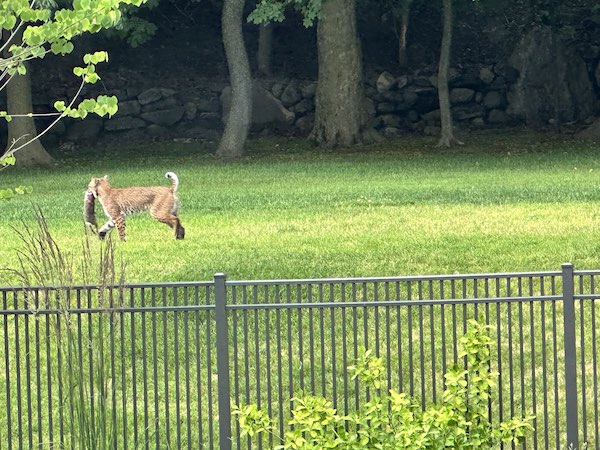
A woman accidentally locked her keys inside her car while her dogs were inside on Greendale Road Sept. 19. Police and firefighters assisted her in opening the car door. She was reunited with her dogs. All of the dogs were in good condition and healthy.
On Sept. 20, a Stratton Road mother reported a bobcat ”chased” her child. The animal did not appear sick, she said. Police provided her with contact numbers for trappers and to use caution while outdoors.
A bobcat was reported on Brite Avenue Sept. 24.
Lost and found
A Pinecrest Road resident reported losing a license plate in the Village Sept. 19.
A boy lost Apple air pods in the high school lunchroom Sept. 21. Another person found the air pods in the lunchroom and put them in his car. The GPS feature in the air pods identified the location of the air pods. Police spoke with the person who found the air pods, and the person returned them.
Firefighters
Firefighters stood by for Con Edison at the site of arcing wires on Montrose Road Sept. 18.
A cat was allegedly struck in a crawl space on Weaver Street Sept. 19. Firefighters advised the homeowner to keep food near the crawl space door to lure the animal out when the animal was ready.
Firefighters helped a Greendale Road woman open her car after she accidentally got locked out Sept. 19.
Firefighters assisted with a car accident on Palmer Avenue Sept. 19.
On Sept. 19, a Honda flipped over in a one-car accident on the Bronx River Parkway. The driver fled the scene but came back to the scene when firefighters arrived. She was taken to the hospital by ambulance. Firefighters stood by while the car was turned upright and removed from the scene.
Firefighters helped emergency medical service workers with a Seneca Road patient Sept. 23.
On Sept. 24, firefighters helped a Weaver Street resident pump water out of the basement while the resident waited for a plumber to arrive to assist with a sump pump.
A Post Road resident got locked out of his house Sept. 24. Firefighters helped him open the door.
 This report covering police and fire department activity from Sept. 18-24, and one incident of breaking news from Sept. 27, has been compiled from official information.
This report covering police and fire department activity from Sept. 18-24, and one incident of breaking news from Sept. 27, has been compiled from official information.
This police report is sponsored by Scarsdale Security who does more than just security. Contact them about remote video for your home or business. Call 914-722-2200 or visit their website.
Where to Worship for the High Holidays
- Details
- Written by: Joanne Wallenstein
- Hits: 1953
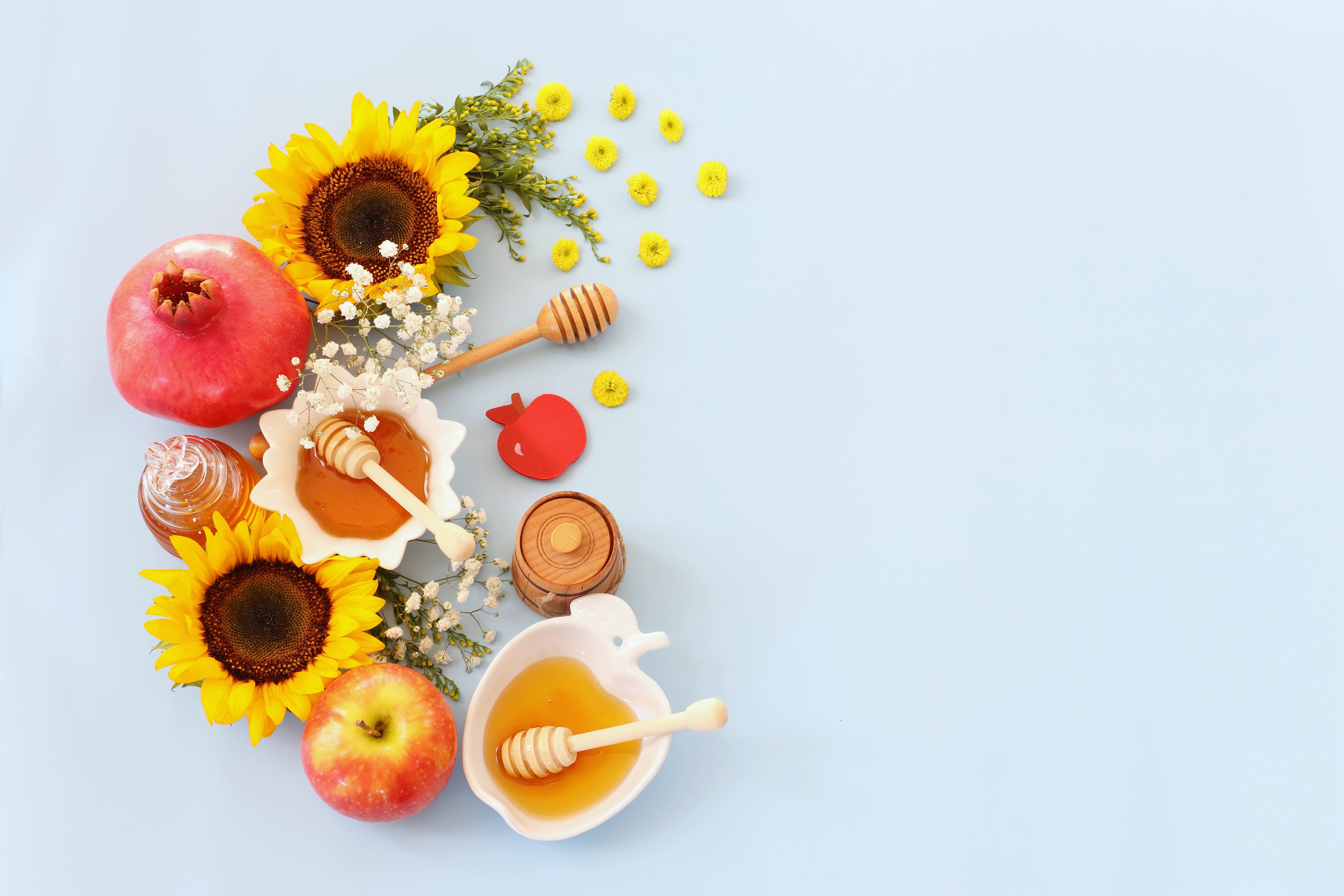 Photo credit: Katarzyna HurovaOnce we get through this heat wave, thoughts will move on to the high holidays, with Erev Rosh Hashanah on Friday September 15 and Kol Nidre on September 24, 2023. If you belong to a synagogue you probably already have your tickets for services. However if you’re not a member and want to attend services, several local synagogues invite the public for select services during the holidays.
Photo credit: Katarzyna HurovaOnce we get through this heat wave, thoughts will move on to the high holidays, with Erev Rosh Hashanah on Friday September 15 and Kol Nidre on September 24, 2023. If you belong to a synagogue you probably already have your tickets for services. However if you’re not a member and want to attend services, several local synagogues invite the public for select services during the holidays.
Here is the schedule of services open to the public from three local synagogues. If you would like to attend, they all ask that you email them in advance. See below for instructions.
Congregation Kol Ami
255 Soundview Avenue
White Plains, NY 10606
Kol Ami services open to the public include:
Rosh Hashanah Family Service: Saturday, Sept 16 at 3:30pm
Rosh Hashanah Day 2 Service: Sunday, Sept 17 at 10:00am
Yom Kippur Family Service: Monday, Sept 25 at 3:30pm
Yom Kippur Yizkor/Neilah Service: Monday, Sept 25 at 5:00pm
Sukkot and Simchat Torah Services are also open to the public:
Erev Sukkot service: Friday, Sept 29 at 6:15pm
Sukkot Morning service: Saturday, Sept 30 at 10:00am
Erev Simchat Torah: Friday, Oct 6 at 6:15pm
Simchat Torah Morning service: Saturday, Oct 7 at 10:00am
Pre-registration is required for Rosh Hashanah and Yom Kippur services. Click here to sign up:
https://nykolami.org/high-holy-days/
Scarsdale Synagogue Temples Tremont and Emanu-El
2 Ogden Road
Scarsdale NY 10583
914-725-5175
Erev Rosh Hashanah: Friday, September 15
8 PM Sanctuary
Rosh Hashanah: Saturday, September 16
Young Family Service 9-9:30 AM Sanctuary (for families with children 2nd grade and younger)
Second Day Rosh Hashanah: Sunday, September 17
Morning Service 10:30 AM Sanctuary
Yom Kippur: Monday, September 25
Young Family Service 9-9:30 AM Sanctuary (for families with children 2nd grade and younger)
Afternoon Healing Service 3:00 PM Sanctuary
Yizkor 4:45 PM followed by Neila & Havdalah Service - Sanctuary
To sign up, email fawn@sstte.org and write “Services open to the public” in the subject line.
Westchester Reform Temple
255 Mamaroneck Road
Scarsdale, NY 10583
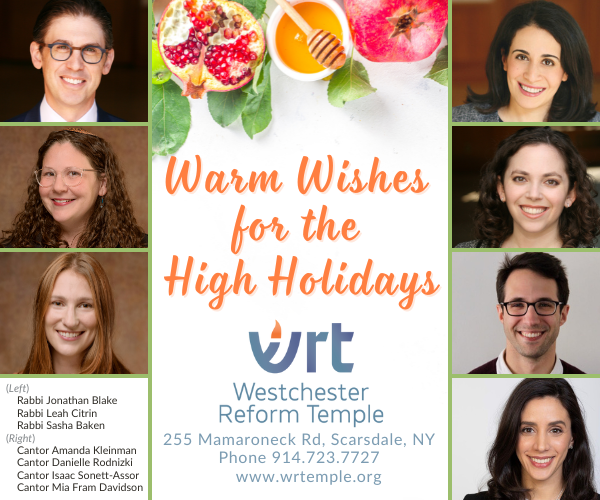 Westchester Reform Temple offers certain community-wide services for the community. (Members and non-Members are welcome) to attend at no charge (see the schedule of services). Registration is required for anyone who wishes to attend.
Westchester Reform Temple offers certain community-wide services for the community. (Members and non-Members are welcome) to attend at no charge (see the schedule of services). Registration is required for anyone who wishes to attend.
Rosh HaShanah Day 1
Saturday, September 16
2:15 pm: *Tot Service (Beit Midrash)
Rosh HaShanah Day 2
Sunday, September 17
10:00 am: *Morning Service (Sanctuary)
10:30 am: *FAMILY Apple Picking at Wilkens Farm (off-site)
5:30 pm: *Tashlich with Young Israel of Scarsdale at Carpenter Pond
Yom Kippur Day
Monday, September 25
2:15 pm: *Tot Service (Beit Midrash)
2:45 pm: *Musical Meditation (Sanctuary)
4:15 pm: * Yom Kippur Afternoon Service (Sanctuary)
includes Yizkor and Ne’ilah
Register here:
https://westchesterreformtemple.my.site.com/s/hhd-registration-guests
Chabad of Scarsdale
Chabad of Scarsdale will celebrate the high holidays at the Scarsdale Woman's Club at 37 Drake Road, Scarsdale. See their full schedule of events at ChabadofScarsdale.com ChabadofScarsdale.com and RSVP at info@chabadofscarsdale.com.
Rosh Hashanah:
Friday, September 15
Evening Services: 7:00 pm
(Light Candles at 6:47 pm)
Shabbat, September 16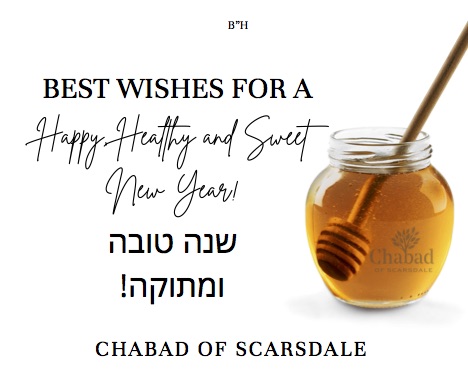
Morning Services: 9:30 am
Children's Program 10:30 am
Torah Reading 11:00 am
Sunday, September 17
Morning Services: 9:30 am
Children's Program 10:30 am
Shofar Sounding 11:30 am
Yom Kippur:
Sunday, September 24
Kol Nidrei: 6:45 pm
Light Candles/Fast Begins 6:31 pm
Monday, September 25
Morning Services: 9:30 am
Children's Program: 10:30 am
Yizkor: 11:30 am
Afternoon Service: 6:00 pm
Neilah Service: 6:30 pm
Fast Ends: 7:28 pm
Services are free of charge. Walk-ins welcome







